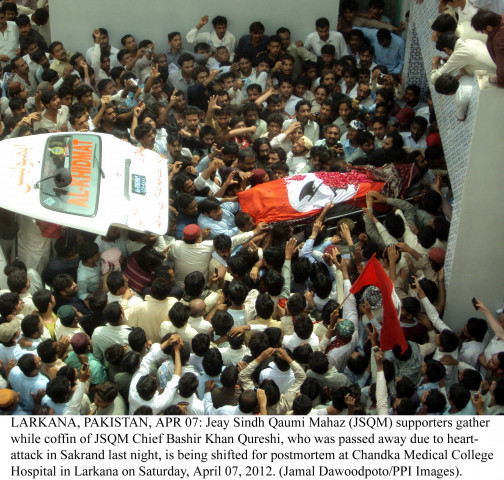Political impact: JSQM loses a leader, and Sindh, one of its biggest supporters
Late nationalist was ‘like a disciple’ of GM Syed.

The death of GM Syed in 1995 led to his party, the Jeay Sindh Tehreek, being splintered into factions. The charismatic student leader Bashir Qureshi emerged as the most prominent Sindhi nationalist and became the head of the Jeay Sindh Qaumi Mahaz (JSQM).
Like Syed’s party, Jeay Sindh Tehreek, JSQM also demands the independence of Sindh – as a separate entity to be called ‘Sindhudesh’. The JSQM is one of the biggest pressure groups in Sindh when it comes to highlighting the province’s issues and rallying people for a cause. In the hours after Qureshi’s death, intellectuals and politicians struggled to answer who could replace him. “I do not see that JSQM will have another leader who is as committed and has a multidimensional personality,” said writer and activist Sohail Memon, who was also part of the Jeay Sindh Student Federation (JSSF). He believes Qureshi’s death will impact the nationalist movement in Sindh. “He used to plead with leaders of different factions to shun their differences and unite for major issues of Sindh. Where can we find this kind of man from who can gather thousands of people in a short span of time?”
Abrar Kazi of the Awami Jamhoori Party disagrees. “Bashir Qureshi was a committed leader representing his own faction, which is the largest party in Sindh. But there is potential in other nationalist groups.”
Analyst and writer Zulfiqar Halepoto said that though Bashir Qureshi had made the radical demand of Sindh’s independence, he was “inclusive” in local politics, be it the issues of the population census, natural resources or contractual employees. “I personally liked his approach of taking Urdu-speaking people on board for major issues, which was really inspiring,” he said. His death, Halepoto assessed, will impact this mission.
Jeay Sindh Mahaz Chairperson Riaz Chandio declared Qureshi’s death as “a great loss for Sindh and Sindhis” and said nobody can fill this gap.
There will also be an impact on young students in Sindh, who formed a large chunk of Qureshi’s support base. A rival of Qureshi since their days in the JSSF, Dr Qadir Magsi, now the chairperson of the Sindh Taraqi Pasand Party, acknowledged this. “He inspired the youth. The young generation of Sindh loves him,” Magsi told The Express Tribune.
“Even though his struggle for the independence of Sindh may have won him recognition as a tough leader, he was a proponent of peace in Sindh,” said Ibrahim Joyo, a noted Sindhi writer. “He wanted all the people who inhabit the land to live in peace without violating each other’s rights and honour.”
Joyo attributed the support Qureshi enjoyed to the loyalty he showed to GM Syed, who was the first to demand independence of Sindh after the creation of Bangladesh. “The slogan found some appeal with the general sense of deprivation among people. He was not just a political follower or supporter of the late GM Syed but a disciple who loved his spiritual leader.”
Published in The Express Tribune, April 8th, 2012.



















COMMENTS
Comments are moderated and generally will be posted if they are on-topic and not abusive.
For more information, please see our Comments FAQ